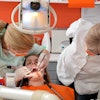
Multiple class-action lawsuits have been filed on behalf of hundreds of U.S. dentists and other medical professionals who claim they were victims of a Ponzi scheme involving the computerized Exhibeo patient education system. Now a judicial panel must decide where the complaints should be heard, and the decision could have a critical impact on the outcome.
The lawsuits center on the 1,672 Exhibeo patient education systems that were leased to dental and medical offices. The plaintiffs charge that Exhibeo developer Brican America and marketing partner NCMIC Finance -- doing business as Professional Solutions Financial Services (PSFS) -- defrauded some 2,000 dentists, optometrists, and chiropractors across the U.S. who signed leasing agreements for the systems.
Dentists who have joined the litigation say they've been left holding the bag for Exhibeo contracts that are costing them hundreds of dollars a month, without receiving the marketing support funds they thought they'd get to offset the cost of the system.
Attorney Ron Gossett of the Florida law firm Gossett & Gossett filed a class-action suit in March against Brican and PSFS in the U.S. District Court for the Southern District of Florida on behalf of 200 medical professionals. The number of medical professionals who have joined the suit has now grown to 676.
Alan Raskas, D.D.S., of Cherry Hill, NJ, who used the system to educate patients on topics ranging from implants to periodontal disease, said PSFS sent him a letter stating that if he didn't keep his payments up to date, it would sue him. He consulted an attorney who contacted PSFS and was told that if he wanted to get out of the contract he would have to pay $26,000.
"Basically, they wanted the amount of the entire lease," Dr. Raskas told DrBicuspid.com. "Out of fear, I brought the account up to date and made two payments."
He stopped making payments after joining Gossett's lawsuit. Recently, he said "two very sleazy-looking guys" from PSFS served him with legal documents. PSFS is suing medical professionals who have continued to make payments, saying the suits are based on projected actions, according to Gossett.
"Anyone who joined Gossett's suit is being served, even people who are still making payments," Dr. Raskas said.
PSFS has since agreed to stop contacting Gossett's clients and stop filing reports with credit bureaus on any Exhibeo customers, Gossett said.
Attorneys for Brican and PSFS did not return calls for comment.
Several hundred New Jersey dentists leased the systems and many have also stopped making payments, Dr. Raskas said. Some have decided to fight PSFS on their own. "One dentist told me that he'd take his chances," he said. "He didn't want to spend $1,000 to get involved in the suit."
Ironically, Dr. Raskas still likes and uses the system. "It's a very nice system, very high-tech, and patients are very responsive to it," he said. "Patients will ask about the procedures they saw."
Sales contracts, not leases
Gossett's lawsuit alleges that Brican used "fraudulent sales" to create a "pool of money" to fund Viso Lasik Medspa, another business developed by Brican. The lawsuit is one of four class-action suits that have been filed so far. Additional complaints have been filed by the Charlip Law Group in Florida, where Brican is based and many of the dentists and optometrists who leased the systems are located, and in California and New Jersey.
“It's a type of fraud that has been around for quite some time.”
— Ron Gossett, attorney
Gossett, who has won several cases involving leasing agreements, said the central issue is that the marketing agreements are not really leases but sales contracts that create a security interest, which are governed by different laws.
"It's a type of fraud that has been around for quite some time," he told DrBicuspid.com. "We have testimony from employees of NCMIC and Brican that NCMIC rewrote the advertising agreement and the cancellation provision and allowed Brican to continue to use them in a deceptive fashion."
NCMIC attorneys want the cases heard in Iowa, where the company is based, because courts there have shown great deference to leasing companies when applying laws governing leasing disputes, Gossett explained. Most lease agreements include waiver of defense clauses that require the lessee to unconditionally pay rent to the assignee, in this case PSFS.
A hearing will be held July 28 by the U.S. Judicial Panel on Multidistrict Litigation to determine whether the cases will be heard in Iowa or Florida. Even if they are heard in Iowa, a recent decision by the Iowa Supreme Court concluded that advertising agreements such as the one Brican used are really security agreements, not financing leases, Gossett said. The ruling means the waiver of defense clause would not apply to the Brican cases, and fraud claims can be considered.
Exit clause
A typical Exhibeo package featured a 17-inch liquid crystal display, a digital camera, a 42-inch plasma television, and customized informational videos. Once installed in a medical office, the system would play a video loop on dental or medical procedures that might be available in the practice.
Exhibeo systems were marketed to U.S. medical and dental professionals through an August 2005 deal between Brican America and PSFS, under which PSFS provided financing for medical professionals to lease the system.
The customer marketing agreement also provided that if Brican stopped making the advertising payments, customers had an exit clause in which they could either stop paying the lease or Brican America would buy back the system and lease agreement so that customers would have no further financial obligation.
But last year, PSFS sued Brican for $38 million, claiming that it never knew about the exit clause when it signed the 2005 contract with Brican, thus PSFS was not required to honor the clause (the lawsuit was subsequently dismissed). Then, in January 2010, Brican announced that it would no longer honor its customer marketing agreements due to a lack of funds and "market conditions."
The underlying issue, according to Gossett, was that PSFS became too heavily invested in the Exhibeo leases. PSFS paid $24,000 per lease to Brican, and while the total equipment costs were less than $3,000, there was "additional overhead," Gossett told DrBicuspid.com.
"In short, the lease of equipment with a marketing or advertising contract was a Ponzi scheme which could survive as long, and only as long, as more and more transactions were closed to fund the payment of the marketing contracts," the Gossett & Gossett complaint states. "In fact, unless sales of contracts outpaced the payments due under the marketing and advertising contracts, the Ponzi scheme would, and did, collapse."
PSFS acknowledged the importance of new sales in keeping the business model running in a document sent to customers in early March 2010. The document stated that PSFS only learned about Brican's customer marketing agreements in April 2009, and PSFS filed suit against Brican for breach of contract a month later.
Customers still accountable
PSFS also stopped funding the leases, which meant that customers stopped receiving the monthly $500 payments for running the Viso ads. When this happened, many took advantage of the exit clause that they thought would enable them to stop making lease payments. But PSFS maintains that because it was originally unaware of the agreement between Brican and its customers, Exhibeo customers are still liable for the leases.
"While PSFS regrets the difficulties Brican's customers are facing due to discontinuance of the advertising ... PSFS cannot forgive or release any lessee's lease obligation, but will certainly attempt to be flexible in working the lessees on repayment of their lease contract," the company stated in March.
Having written 1,672 Exhibeo leases, PSFS stands to make $10 million over the course of the five-year contracts ($6,000 per lease), according to Gossett.
"Our primary goal is to have the leases held to be unenforceable and to recover the plaintiffs' attorneys' fees," he said.
The American Dental Association (ADA), which has written about the suits on its website, has declined to take a position on the matter. But Dr. Raskas thinks the organization should advocate for dentists. "It ticked me off that the ADA is standing on the sidelines in this," he said. "I think they should take a stand."
Copyright © 2010 DrBicuspid.com



















